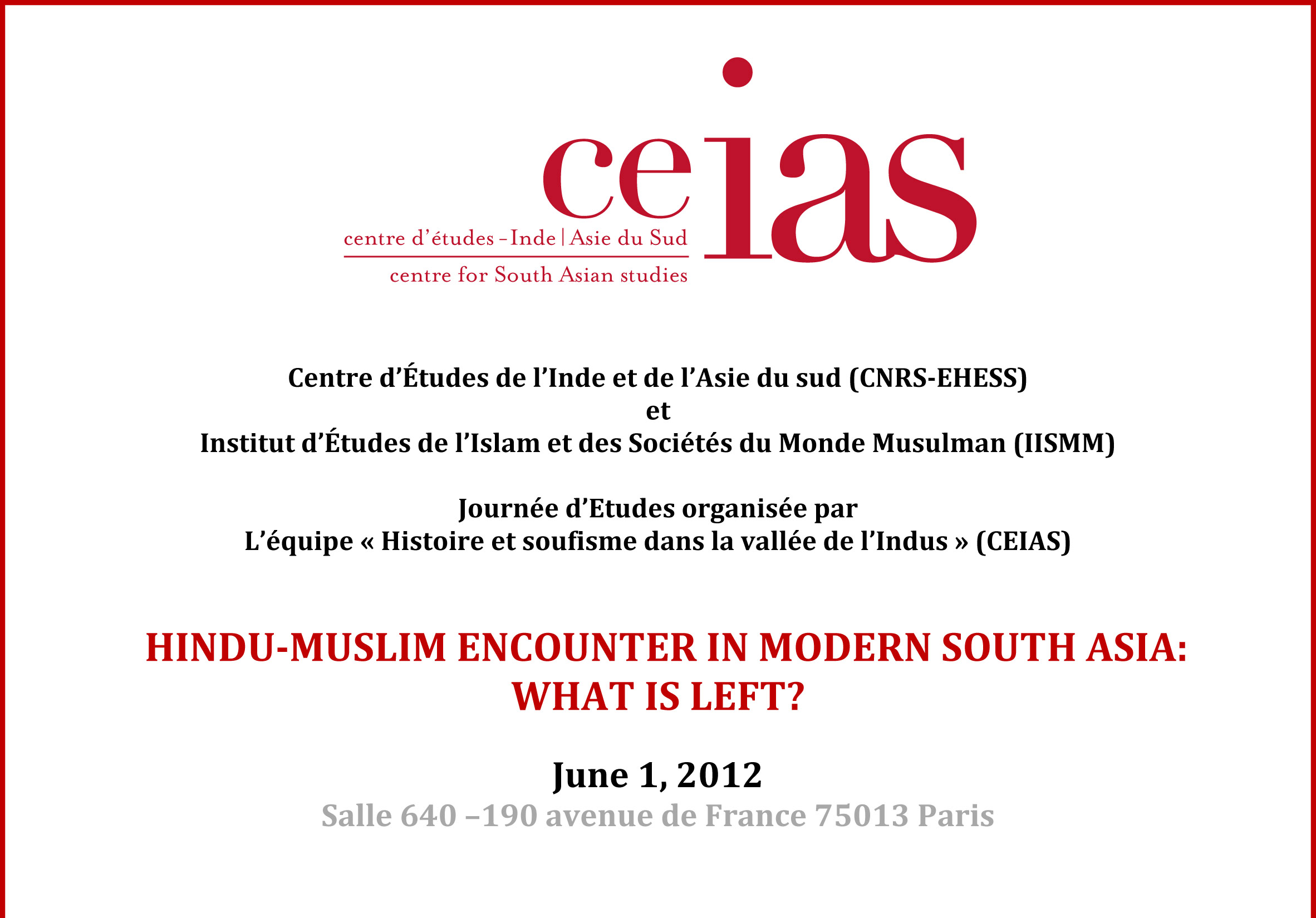Vie scientifique | Journées d'études
Hindu‐Muslim Encounter in Modern South Asia: what is left?
Journée d’Etudes organisée par l’équipe « Histoire et soufisme dans la vallée de l’Indus »
In 2009, Finbarr Barry Flood published a book entitled Objects of Translation. Material Culture and the Medieval “Hindu‐Muslim” Encounter (Princeton University Press). His main argument is that the exchanges between different religious cultures were based on a translation process through which “the circulation, mediation, reception, and transformation of distinct cultural forms and practices is effected” (p. 8). The objective of this workshop is to contribute to the study of Hindu‐Muslim encounters in Modern South Asia from a variety of perspectives. Although religious identities in this part of the world, both Muslim and Hindu, have been polarized throughout the post‐colonial period, such encounters are still at work in India and Pakistan.
During this one‐day workshop, several case studies will be presented so as to unpack the processes by which such encounters take place today. Though a number of studies have been devoted to this topic, especially in the field of literary studies, other ‘minor’ traditions have not received much attention from academia. What is more, Hindu‐ Muslim encounters are rarely approached from a ritual and cultural perspective. Usually taking place in towns and villages located at the margins of imperial centers, the Hindu‐ Muslim encounters have also been a site of negotiation at the local level, seeing the emergence of original forms of interaction through the redefinition of boundaries between Islam and Hinduism.
The workshop will welcome Professor Carl Ernst, from the University of North Carolina at Chapel Hill.
Document(s) à télécharger
Les sites du CEIAS
- SAMAJ | The South Asia Multidisciplinary Academic Journal
- CEIAS - Facebook
- CEIAS - Twitter
- CEIAS - Newsletter
- Le Bulletin de la Bibliothèque
- Régionalisme & cosmopolitisme
- DELI | Dictionnaire Encyclopédique des Littératures de l’Inde
- DHARMA | The Domestication of “Hindu” Asceticism and the Religious Making of South and Southeast Asia
- TST | Texts Surrounding Texts
- STARS | Studies in Tamil Studio Archives and Society 1880-1980
- I-SHARE | The Indian Subcontinent’s Shared Sacred Sites
- Sri Lanka et diasporas
- Sindhi Studies Group
- Carnet du Master Études asiatiques
- Master “Asian Studies”
- Social Sciences Winter School in Pondicherry
- Caste, Land and Custom
- Musiques indiennes en terres créoles
 Actualités
Actualités
Écrire dans le monde indo-persan
Vie de l'École -Après un premier workshop en mai 2023 ayant permis aux jeunes chercheurs en études indo-persanes de se rassembler, ce second volet organisé par des doctorants de l'EHESS du Centre d'études sud-asiatiques et himalayennes - Cesah (EHES/CNRS) et du Centre de recherche sur les circul (...)(...)
Devenir juifs : conversions et assertions identitaires en Inde et au Pakistan
 Débat - Mardi 9 mai 2023 - 14:00Présentation« L’an prochain à Jérusalem ! », scande un homme portant une kippa dans une synagogue de Karachi au Pakistan. Ses paroles sont répétées en chœur par les membres de sa communauté, un groupe comptant près de trois cents personnes qui s’autodésignent par (...)(...)
Débat - Mardi 9 mai 2023 - 14:00Présentation« L’an prochain à Jérusalem ! », scande un homme portant une kippa dans une synagogue de Karachi au Pakistan. Ses paroles sont répétées en chœur par les membres de sa communauté, un groupe comptant près de trois cents personnes qui s’autodésignent par (...)(...)
Centre d'Études de l'Inde et de l'Asie du Sud
UMR8564 - CNRS / EHESS
54 boulevard Raspail
75006 Paris, France
Tél. : +33 (0)1 49 54 83 94
Communication :
nadia.guerguadj[at]ehess.fr
Direction :
dir.ceias[at]ehess.fr
La bibliothèque du CEIAS
Maison de l'Asie
22 avenue du Président Wilson 75016 Paris
54 boulevard Raspail
purushartha[at]ehess.fr


